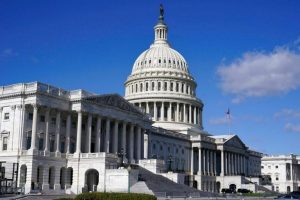2021 in review: How the push for amnesty for illegal immigrants stumbled

‘Byrd Bath’ takes immigration out of spending bill
Fox News congressional correspondent Chad Pergram explains the significance of the Byrd Rule amid the fight to pass Biden’s spending bill on ‘America Reports.’
When President Biden entered office in January, with Democratic control of the Senate and House, there was a great deal of hope from left-wing immigration activists that 2021 would be the year in which a broad pathway to citizenship for millions of illegal immigrants would be created and signed into law — but as the year ends, those hopes have so far been dashed as multiple efforts have hit the rocks.
The Biden administration released a proposal on Inauguration Day, which eventually became the U.S. Citizenship Act of 2021, and was headlined by an 8-year path to citizenship for illegal immigrants already in the country.
As the bill stalled in Congress, the White House expressed openness to breaking the legislation up into individual pieces that might be able to gain Republican support, with some Republicans having expressed willingness to grant permanent status to DACA recipients.
White House press secretary Jen Psaki told reporters that “Congress will have to work through what it looks like moving forward, and what components will be included here and what components could be dealt with separately.”
But as the border surge of 2021 grew over spring and summer, with more than 200,000 encounters a month at one point, there was little sign of a broader Republican appetite for immigration measures that didn’t include border security. And so Democrats tried a different approach.
Build Back Better/budget reconciliation
As Democrats looked for ways to pass sweeping parts of President Biden’s agenda on issues like climate change, family policy and immigration, they eventually zoned in on the budget reconciliation process in order to bypass the Republican filibuster. The budget reconciliation process requires only 50 votes in the Senate, and therefore if all Democrats in the chamber voted in favor, with Vice President Kamala Harris casting a vote as a tiebreaker, legislation would pass the chamber.
In outlines for the bill were a variety of proposals for amnesty or protections for illegal immigrants, in addition to sweeping changes to legal immigration. The first of those plans would grant a pathway to citizenship for DACA and TPS recipients, farmworkers and those deemed “essential workers.” However, that plan was rejected by the Senate parliamentarian in September, who ruled that it was inappropriate for a budget bill as the measure dwarfed its budgetary impact.
Lawmakers then proposed a “Plan B” to update a registry to allow amnesty for illegal immigrants who arrived before 2010 — which was also rejected by the parliamentarian. Finally, a much more limited Plan C would allow expanded parole powers to grant legal status, including work permits, to an estimated 8 million illegal immigrants for up to 10 years. That too met with the disapproval of the parliamentarian.
Democrats appeared keen to continue, however, with some left-wing Democrats floating the idea of ignoring the parliamentarian altogether.
But the plan to include an amnesty in the legislation was dealt a major blow in October, when Sen. Joe Manchin, D-W.Va., said that he would not support overruling the parliamentarian and was opposed to any sort of amnesty in the BBB. Without his vote, measures stood zero chance of passing the chamber.
“For us to even be talking about immigration without border security is ludicrous,” he said when asked by Fox News’ Bret Baier if he supported amnesty in the legislation. “I’ve told them…the average person turns on the TV and sees what’s going on in the border, and that basically scares the bejesus out of an awful lot of people,” he said. “If [migrants] think they can come and get all the different benefits that people, the citizens of America get are entitled to, they’re going to continue to come. So, no, I don’t think so.”
Manchin would then, in December, deal another blow to the legislation as a whole by saying that he could not support the bill at all.
Going into 2022, activists are certain to continue with their push to obtain various forms of amnesty or legal protection for those in the country illegally, but with a 50-50 Senate still in place and looming midterms that could see Republicans take control in both chambers, it is far from clear whether those efforts will see any success.
Source: Read Full Article


